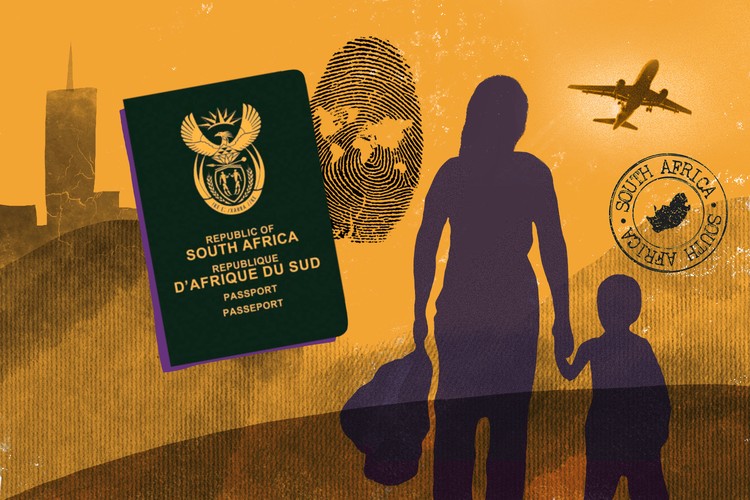
15 October 2025
Home Affairs has stopped processing new asylum applications unless applicants have a transit visa, say lawyers. Home Affairs has not responded to our queries. Graphic: Lisa Nelson
Law clinics are overwhelmed with queries from asylum seekers blocked from accessing South Africa’s asylum system.
Asylum seekers are required to apply for an asylum seeker’s permit (also known as a Section 22 permit) in person at a Refugee Reception Office within five days of arriving in South Africa. There are five such offices in South Africa: Durban, Musina, Pretoria, Cape Town, and Port Elizabeth.
However, since April 2024, access to the asylum system has been restricted to only those who have a valid asylum transit visa, which is supposed to be issued at an official port of entry. The visa is valid for five days.
But many asylum seekers do not have valid transit visas, because of irregular border crossings, a lack of awareness of the requirement, or because the visas expire before they can get to a reception office.
A Parliamentary question to the Minister of Home Affairs revealed that only 91 asylum transit visas had been issued to asylum seekers between 2022 and March 2024.
Amendments to the Refugee Act, implemented in April 2024, require asylum seekers without valid transit visas to undergo an interview during which they must show good cause for not having a valid transit visa.
But practically no one is being found to have good cause, effectively blocking access to all asylum seekers who do not have valid transit visas, according to James Chapman, the Scalabrini Centre’s head of advocacy and legal advisor.
In May this year, the Western Cape High Court found that the transit visa requirement and “good cause” interview were unconstitutional. The case was brought by Scalabrini and Lawyers for Human Rights. The court’s findings still need to be confirmed by the Constitutional Court. In the meantime, the “good cause” requirement is still being implemented.
“There’s thousands of undocumented people at the moment because the office is not accepting new applicants, which causes a ripple effect,” said Shazia Sader, an attorney with UCT’s Refugee Rights Clinic, which helps about 5,000 refugees and asylum seekers a year navigate South Africa’s complex asylum system. The clinic is pursuing strategic litigation to address the problem.
Chapman suggested that asylum seekers without a transit visa carry a document issued by the Scalabrini Centre stating their declaration of intention to apply for asylum, as well as a copy of a 2024 court order preventing the deportation of asylum seekers. People can also approach the courts on their own to try to access the asylum system, he said.
The Department of Home Affairs did not respond to GroundUp’s requests for comment.
For asylum seekers who do get a permit, it only lasts up to six months, so they need to regularly return to refugee offices for it to be renewed. If the permit expires, the asylum seeker may have to pay fines, and their bank accounts could be frozen. Travel to renew the permit can be costly.
Without an asylum transit visa or an asylum seeker’s permit, an asylum seeker may be arrested and face deportation.
The permit gives asylum seekers access to basic services, such as employment, education, and healthcare. But many asylum seekers encounter difficulties opening a bank account and applying for further education or formal employment. Permit holders also may struggle to access public health services and education for their children.
“It’s everyday things that shouldn’t be a problem when it comes to the rights refugees have in South Africa, ” said Zamzam Hirsi, founder of Filanwaa Refugee Women’s Association, which offers community support for refugee women.
Once an asylum seeker has a permit, he or she needs to return to the Refugee Reception Office to undergo an individual interview with a Refugee Status Determination Officer. This officer determines whether to grant or reject refugee status.
If successful, the applicant is entitled to full legal protection and constitutional rights, including the ability to seek employment. If rejected, an asylum seeker can appeal the decision with the Refugee Appeal Authority or the Standing Committee for Refugee Affairs.
In South Africa, many applications are rejected without proper grounds. The UCT clinic often helps with the appeals and, in some cases, launches judicial reviews at the high court for people who have received final rejections. These reviews have been highly successful.
Refugees can apply for permanent residency after ten years, and then eventually apply for citizenship by naturalisation.
In 2024, South Africa hosted over 200,000 immigrants, according to data by the United Nations High Commissioner for Refugees. Of these 53% were registered as asylum-seekers and 39% were refugees.
Thousands are displaced from countries such as Burundi, the Democratic Republic of Congo, Somalia, South Sudan, Rwanda, and Zimbabwe.
“Asylum seekers don’t become asylum seekers because they want to be. No one wants to be a refugee,” says Niall Marinus, an attorney with UCT’s Refugee Rights Clinic.